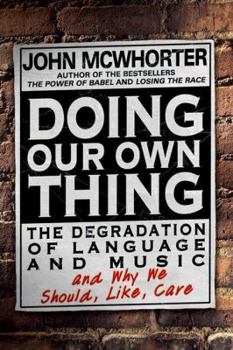Doing Our Own Thing: The Degradation of Language and Music and Why We Should, Like, Care
Select Format
Select Condition 
Book Overview
Related Subjects
African-American Studies Arts, Music & Photography Communication Cultural Education & Reference Foreign Language Study & Reference Language Arts Linguistics Minority Studies Music Politics & Social Sciences Social Science Social Sciences Specific Demographics Words, Language & GrammarCustomer Reviews
Rated 4 starsSpeaking up about speaking down
Not what you think, or at least not what I expected when I started. I expected this to be a more-or-less standard expression of the downward spiral of the English language due to the failures of our education system, the influence of television and music, and the influx of immigrants for whom English is at best a second language. McWhorter, a young African-American (I wasn't familiar with McWhorter before picking up this...
0Report
Rated 4 starsNot as one-sided as the previous review would make you believe
The previous reviewer casually accuses McWhorter of being a cultural elitist, and to some extent that is the case. However, if you actually read the book with an open mind, instead of coming to it with prejudices about cultural relativity, you'll find that McWhorter's arguments are much more subtle than they're presented in the previous review, which boils the two positions down to either appreciating the western canon or...
0Report
Rated 4 starsThought-provoking and perhaps convincing, though with some weak points
John McWhorter has long had a double identity. As a professor of linguistics at the University of California at Berkeley, he's written on the evolution of languages over time (THE POWER OF BABEL) and on English dialectology (WORD ON THE STREET). But he's also a cultural commentator, until recently directing his attention to the issues facing African-Americans (LOSING THE RACE and AUTHENTICALLY BLACK). In DOING OUR OWN THING:...
0Report
Rated 4 starsA Quest for Complexity
Through tracing the simplification of American speech and music over the last century (in some cases, longer), McWhorter demonstrates the loss of complexity, and with it, a love for the English (American) language. Showing his own ambivalence about, or possibly seduction by, this simplification, McWhorter shows how this continued degradation is stripping our public discourse of the very richness and precision we most need...
0Report
Rated 4 starsA Study of America's Linguistic Transition to the Informal
There was a time not long ago in our history when an elaborate command of the English language was considered part of the fabric of American culture. Orator Edward Everett kept a crowd hanging on his every word during his three-hour speech (yes, three hours!) at Gettysburg in 1863 because he was an excellent orator in a time when American society valued excellent orators. Even during the first half of the 20th century,...
0Report














